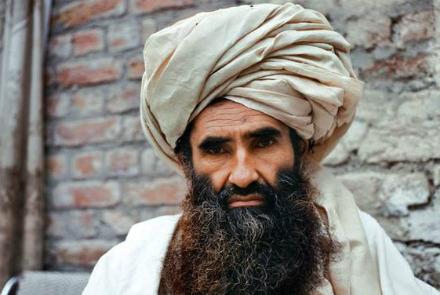Afghan Taliban in a statement on Tuesday has announced the death of Mawalawi Jalaluddin Haqqani, founder of Haqqani network.
“It is with great regret that we inform our believing Mujahid Afghan nation and the vast Islamic Ummah that the prominent Jihadi figure, religious scholar, exemplary warrior and pioneer of celebrated Jihads; the Minister of Frontiers during the reign of Islamic Emirate and member of the Leadership Council, the esteemed Al-Haj Mawlawi Jalaluddin Haqqani has passed away after a long battle with illness,” according to the statement.
The statement added that he had be ill and bed-ridden for a few years.
Haqqani had not been heard from in several years. Reports of his death had been widespread in 2015.
He voluntarily gave up the operational leadership of the group in 2001 to give it to his son, Sirajuddin Haqqani, who is now deputy leader of the Taliban.
Haqqani was born in 1939 in the village of Karezgay in the Zadran district of eastern Paktia Province.
He studied at the Dar-al-'Ulam Haqqaniya Deobandi seminary in 1964 and graduated with a doctorate which entitled him to the status of Mawlawi in Peshawar in 1970.
Haqqani earned a formidable reputation as a military commander in the 1979-1989 anti-Soviet jihad and had close links with Pakistani, US and Saudi intelligence agencies, making him one of the armed commanders in the anti-Soviet jihad.
A fluent Arabic speaker, Haqqani had long-standing ties to Arab mujahideen volunteers and al Qaeda network. The first al Qaeda bases in Afghanistan were built on territory controlled by Haqqani and he was instrumental in channelling Saudi funds for the anti-Soviet resistance.
Although he is not one of the founding members of the Taliban, he switched allegiance to the movement in 1995 just before the Taliban captured Kabul and served in senior positions in the Taliban defence administration, particularly in the northern war against the Northern Alliance commander, Ahmed Shah Masood.
Following the 2001 fall of the Taliban, he moved to the tribal areas along the Afghanistan-Pakistan border.
In the current insurgency against NATO and Afghan government, the Haqqani network has been responsible for some of the deadliest attacks in Kabul.
Haqqani has at least seven sons who are, Sirajuddin Haqqani, Badruddin Haqqani, Nasiruddin Haqqani, Mohammed Haqqani, Omar Haqqani, Aziz Haqqani and Anas Haqqani.


